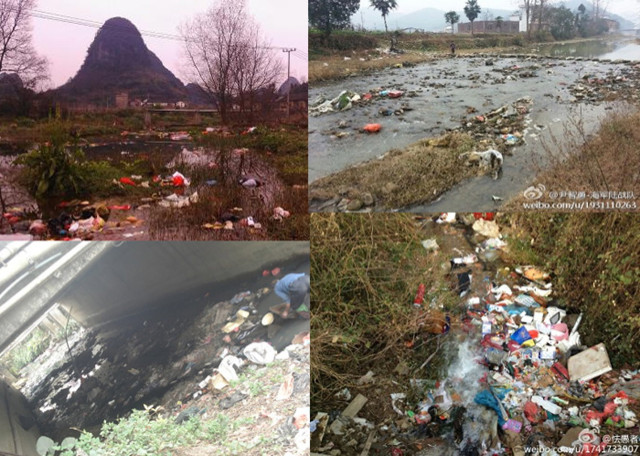China's Netizens Tackle Water Pollution Through Weibo
China’s continuous struggle with worsening air pollution has been well-documented by media, Chinese citizens and the government. Now, netizens are bringing attention to its other national pollution problem -- water.
Most recently, China’s watchdog Internet users began accusing several factories in Weifang, Shandong province, of pumping toxic waste underground, affecting the nearby areas' groundwater sources. Now, the state-run Global Times is reporting that the local Shandong government is offering big rewards (up to 100,000 yuan or 16,000 USD) for any tips in helping expose the illegal underground pumping local factories are doing.
Officials need all the help they can get as it appears government investigations are coming up empty. In fact, a press officer with the Weifang Party Committee, Pan Yuejie, said that as of this weekend 715 company investigations have been made, all of which prove online allegations were false.
“We have 24-hour systems to monitor these factories and if violations happened, we would find out in no time,” Pan said in the Global Times report.
But not everyone was convinced. The online accusations prompted another man to start his own online campaign.
Chinese environmental activist Deng Fei requested that the online community on Weibo, China’s social media site similar to Twitter, take pictures of their hometown’s lakes and rivers while on vacation during the Spring Festival holiday.
Deng had a suspicion that the Weifang incident would not be the only one of its kind.
“How is the river in your hometown? While you’re home for the holidays, take a photo of the river or stream in your hometown and upload it to Weibo for us to see,” he posted to his profile.
The pictures that followed confirmed Deng Fei’s suspicions.

“I was just angry alter receiving information from Web users saying that the groundwater in Shandong had been polluted and I forwarded it online. But it came as a surprise to me that after I sent out these posts, many people from different places in northern and eastern China all complained that their hometowns have been similarly polluted,” Deng said in an interview with the Global Times.
One Weibo user told the Global Times that the effects of the water pollution are apparent in the local population.
“Children suddenly [were covered] in red blotches and cancer rates have spiked in the counties of Diaozhai and Shuizhai in Zhangqiu, Shandong. But villagers are not rich enough to drink bottled water or they are just not fully aware of how serious the pollution is.”
And though China’s central government has issued a 10-Year-Plan that tackles the issue of curbing groundwater pollution by 2015, many are dissatisfied with the government’s efforts.
Jin Zengmin, an entrepreneur in Hanzhou, Zhejiang province, in eastern China, is so frustrated with the local government’s inaction regarding cleaning up water he proposed a deal on his Weibo page.
“If the environmental protection bureau chief dares to swim in the [Ruian] River for 20 minutes, I will pay [him] 200,000 yuan,” ($32,000) he posted on Weibo, along with photos of the river in question.

Jin told Chinanews.com that the river was once used for washing clothes and vegetables by the local villagers. The Shanghaiist, a Shanghai-based news-blog, called images of the Ruian a “moving trash pile.”
The local government’s environmental protection bureau chief, Bao Zhemin, responded to Jin, admitting that the river is clearly polluted, but said that the pollution was a result of human trash, not factory dumping, citing the province’s overpopulation as the cause of the river’s overflowing trash.
“Overpopulation of this region is the main reason behind the pollution. … [The population] has largely exceeded the local environment’s capacity,” Bao said as quoted by Chinanews.com.
Bao said the province’s factories draw hundreds of thousands of migrant workers from all over the country, multiplying waste levels exponentially.
© Copyright IBTimes 2024. All rights reserved.






















